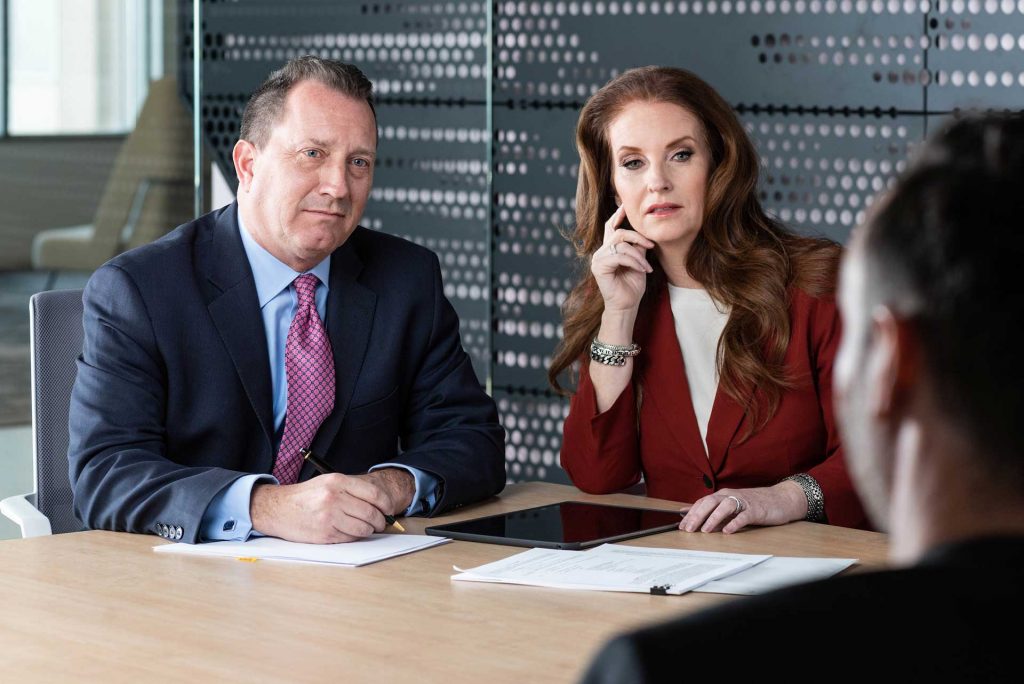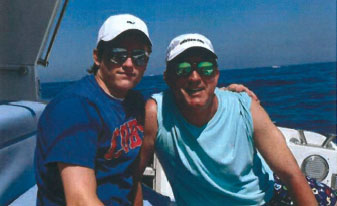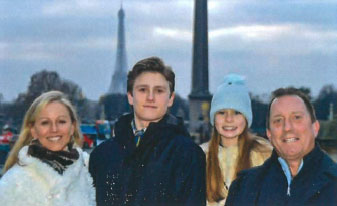PI SUCCESS SPRANG FROM CARING AND SOUTH SIDE SENSIBILITY
JUNE 10, 2019
JUNE 10, 2019
by Jordyn Reiland and Elizabeth Davies
Jeffrey J. Kroll’s mantra is simple: It’s not about where you start, but where you finish.
And with the birth of his new firm he is positioned to finish quite well indeed.
Kaveny + Kroll opened in late February in the heart of Chicago’s business district. The new firm is the marriage of two highly successful personal injury practices dedicated to providing their combined legal expertise and a high level of personal attention to clients who were wrongfully injured.
For his part, Kroll brings a nearly 30-year career that highlights verdicts or settlements in more than 80 cases that resulted in awards of $1 million or more. Of those, six cases exceeded $10 million.
His success hasn’t gone unnoticed. For seven consecutive years, the American Trial Lawyers Association listed Kroll as one of the Top 100 trial lawyers in Illinois. In 2002, Kroll was the only personal injury attorney from the Midwest that the National Law Journal selected for its list of the Top 40 attorneys under the age of 40.
Kroll was also a part of a trial team in August 2017 that secured an Illinois personal injury record verdict of $148 million. In that case, a Cook County jury decided on behalf of a woman who became paralyzed by a fallen pedestrian shelter at O’Hare International Airport.
Having observed Kroll while on the bench and as an opponent, former DuPage County Circuit Judge Ronald D. Sutter feels his “reputation is well deserved.”
“He’s a top trial lawyer, if not in the whole country, certainly in the state of Illinois,” Sutter says. “What makes him that way is he has a very keen legal intellect. He can quickly identify the pertinent issues in the case, and he has the ability to resolve any lawsuit.
“Overall, he’s top of the class.”
BRANCHING OUT
The Kroll family spent their winter holiday in Paris last year, a chance to test out 17-year-old Jack’s three years of French classes. It was one of a series of trips the family has taken in recent years as they try to show Jack and 10-year-old Lily glimpses of the world around them.
On his first day back after the trip, Kroll took a call from longtime colleague Elizabeth Kaveny. She asked him to breakfast and suggested the time was right for the two of them to branch out on their own.
“He is quick-witted, engaging and a person others genuinely want to be around,” Kaveny says. “Most of all, he is one of the most talented attorneys I have ever seen in the courtroom. Absolutely spellbinding.
“There is no one-absolutely no one-in the city of Chicago whom I would rather be partners with.”
It didn’t take long for Kroll to get on board.
“It was a no-brainer,” he says. “Beth is a top trial lawyer. We thought it was the perfect timing for both of us.”
So, Kroll left his partnership at Salvi, Schostok & Pritchard P.C., the firm where he worked on that $148 million O’Hare pedestrian shelter case.
“There were great people there, lifelong friends and a tremendous mentor in Pat,” he says. “I learned so much, but I wanted to start something new.”
In addition to Kaveny + Kroll, the firm features three associates. And while they will be generating new business, some existing clients moved with them to their new firm.
“You have such relationships with these people, it’s natural that they want you to see it to the end,” he says.
At his new firm, Kroll hopes a lower volume of cases will allow him to spend more time with clients.
“We’re being very selective on the cases we take in and the people we want to help,” he says.
LESSONS FROM THE SOUTH SIDE
Kroll learned more than a few things growing up on the South Side of Chicago in Brighton Park.
“Growing up on the South Side of the city enabled me to see through the B.S., see who is real, who is believable, who you can trust, who you want in your foxhole,” Kroll says. “It was amazing how growing up in the city taught you all of those things.”
His mom was a bank teller, and his dad was a truck driver. In another life, given a different set of circumstances, he might have followed in his father’s footsteps.
“My dad was making about $28,000, and I thought that was like a zillion dollars from where I grew up,” Kroll recalls. “I contemplated it at times. But when he got called out at 3 a.m. because he had to plow during a snowstorm, I thought, ‘I don’t want this life.”
He certainly never imagined he would be one of the top attorneys in Illinois.
“I never in a million years thought I would be an attorney,” Kroll says. “Where I grew up, candidly, we were afraid of lawyers more than we embraced them.”
Now looking back, Kroll attributes his blue-collar background to helping him better understand and appreciate “normal people.”
“Growing up where I did, you realized who your friends were, who wanted something from you, who you didn’t believe. And that’s kind of what jurors do on a daily basis,” Kroll says.
Kroll’s knowledge of the neighborhoods, parishes and parks that make up Chicago has given him a leg up when relating to a pool of potential jurors.
“I think it’s important because we need to gain their trust. Once I gain their trust, I want to be their guide, I want to lead them through the trial,” Kroll says. “If they think I’m fake or phony, they are not going to follow me through a trial.”
After graduating from Marist High School in 1982, Kroll attended University of Wisconsin-Whitewater for about 1½ years before transferring to DePaul University.
When he realized being a professional football or baseball player wasn’t in the cards, Kroll planned to be an accountant. But all it took was one accounting course to realize that was not where he should head.
Late in his junior year, Kroll took a business law class he thoroughly enjoyed. He then began to understand the parallel between competition in sports and arguing the law.
“I don’t like to lose, but I’m not afraid to lose, and there’s a subtle distinction in that,” Kroll says. “Many lawyers are afraid to try a case because they may lose. I don’t like to lose, and I will prepare my heart out, but I understand that losing could be part of the game.”
Kroll went on to graduate in 1987 with a bachelor’s degree in finance and economics. He then earned a law degree from DePaul University College of Law in 1990.
Kroll’s highly competitive nature is one of the many traits that set him above the rest, according to longtime colleague and fellow Chicago trial attorney Richard L. Pullano.
“Jeff is a winner, and he’s going to find a way to win on behalf of his client,” Pullano says. “He’s one of those guys who kind of envisions winning almost like an athlete.”
STARTING OUT AND STRIKEOUTS
Immediately after graduation, Kroll secured a job working alongside Robert A. Clifford at what eventually became Clifford Law Offices.
But after losing his first four or five trials, Kroll second-guessed his ability as a trial lawyer. Clifford, one of his first mentors, sent him to talk to Jack Hayes, a distinguished trial lawyer who is now deceased.
Hayes told Kroll he had also lost several trials to start his career, eventually becoming what Kroll believed was the epitome of “It’s not where you start but where you finish.”
Kroll also fondly recalls a moment at the end of their conversation that keeps close to his everyday work-quite literally.
Hayes told him Babe Ruth had 1,330 strikeouts. After making chat comment, he said to him very matter-of-factly, “Keep on swinging.” To this day, Kroll has that message on a plaque in his office.
Pullano says Kroll’s success came as he found ways to tap into what the great lawyers before him have done.
“He’s a student of our profession,” Pullano says. “He obviously is now one of those veterans, but when I was with him 20 years ago, he was always reading the depositions and closing arguments of the great lawyers, carving out time to head over to the courtroom and watch the great ones.”
One of those he took time to watch was up-and-comer Elizabeth Kaveny.
“I’ve known Beth since we were baby lawyers,” Kroll says. “I would watch her trials, and she would watch mine. We spoke on the same panels. Now, we’re very excited about the prospects of what can happen with Kaveny + Kroll.”
BUILDING RELATIONSHIPS
For Kroll, half the battle of being a good lawyer is building and maintaining relationships.
“They’ve come to you when the worst of all things has happened to them and they don’t know where to turn,” Kroll says. “You need to be some stability in the middle of a storm, but you’ve also got to provide guidance, you have to provide counseling and you have to be that shoulder to cry on for them.”
Pullano says the ability to possess those traits came early for Kroll.
“I think to see great results and full compensation for our clients, you need to spend an inordinate amount of time with the plaintiff to fully understand who they were before and how their injury impacted their life,” Pullano says. “If you’ve ever listened to him weave in a closing argument, it is readily apparent he has spent an enormous amount of time with his client.”
 Kroll and Elizabeth Kaveny, senior trial attorneys at Kaveny + Kroll, opened their firm in February 2019.
Kroll and Elizabeth Kaveny, senior trial attorneys at Kaveny + Kroll, opened their firm in February 2019.
That’s evidenced by the fact that Kroll has attended weddings for nine former clients, celebrating with them a future even though he’s a reminder of their painful past.
David Darden, whose daughter Tierney was the woman injured at the O’Hare pedestrian shelter, agrees that it was clear how much Kroll cared for their family.
“It was visible to the jury and to anybody in the audience how much he did care about Tierney,” says Darden. He notes that Kroll continued to check in on how Tierney was doing long after the trial.
That caring nature-and the way it made Kroll that much more determined to fight-made the difference in Darden’s case.
“You could tell chat he really cared for my case and for me especially,” Tierney Darden says. “It kind of touched me in a way, made me emotional and made me feel more confident and brave in what we were doing.”
LOOKING TOWARD THE FINISH LINE
Kroll isn’t looking to join the prediction business, but he likes where he has been-and where he is headed.
“Life is fleeting, and you realize this not only goes with this job but also by how quickly life goes by,” Kroll says. “I’ve got good kids. My wife, Ginger, is supportive of my career. Life is good.”
The nature of his work-often representing parents whose children were killed or injured-sends Kroll home at night with an extra edge of gratitude. It’s on those nights, when the devastation of loss hits too close to home, that he cheers a little louder for Jack’s sports team or sits a little taller at Lily’s dance recitals and plays.
“It makes me give them an extra hug,” he says.
Despite the devastation, Kroll appreciates his role in righting a wrong. He tries to be an emotional rock for his clients, knowing they are persevering through perhaps the most difficult time of their lives. And then, one day, he is able to get them to the other side. Never to a place of full restoration, never to a place of forgetting. But to a place of looking ahead.
That ongoing relationship-the one that doesn’t end when the case does-is why Kroll continues to push on. “That’s the most gratifying part,” he says.
And that’s why, at age 55, Kroll is striking out on a new venture. He has more lives to touch, more justice to secure.
Besides, he knows the finish line will come in due time.
“I enjoy walking into a courtroom, and I enjoy getting nervous,” he says. “The day I stop getting a little nervous, the day I stop getting butterflies in my stomach is probably the day I stop doing this.
“I don’t anticipate that day coming for a long time.”
 Son Jack and Kroll in Italy during the summer of 2018
Son Jack and Kroll in Italy during the summer of 2018
 Kroll and daughter Lily vacationing in Costa Rica
Kroll and daughter Lily vacationing in Costa Rica
 In Paris in 2018, from left:
In Paris in 2018, from left:
wife Ginger Kroll, son Jack, daughter Lily, Kroll
This article originally appeared in Leading Lawyers Magazine-Consumer Edition for 2019 and has been reprinted with permission.
©2019 Law Bulletin Media